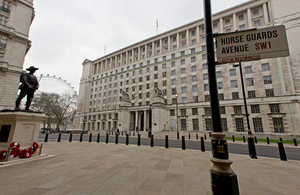Refurbished pumping station makes Doncaster more resilient to climate change
The £14 million scheme is an investment in one of South Yorkshire’s most important flood defence assets and makes the Bentley area more resilient to the impacts of climate change.
The pumping station is used almost daily, not just during flood incidents. Its impact would be noticed within a few days if it stopped working, even in dry weather.
Bentley experienced devastating flooding in 2007 when the pumping station flooded, making it inaccessible for Environment Agency incident response teams. This led to the decision to refurbish and upgrade it, to make it more resilient.
The government funded refurbishment of the pumping station increased overall pumping capacity by 20 per cent and reduced operational carbon emissions by over 20 per cent.
Refurbishing the existing pumping station, instead of constructing a new one, has saved the taxpayer £8 million and made 60 per cent carbon savings. This is part of the Environment Agency’s work to use new innovative techniques, technology and lower-carbon materials to reduce its carbon footprint and help reach net zero targets.
The site is now significantly more flood resilient because all the vital equipment is now positioned out of the way of potential flooding, and access routes to the site have been raised above flood level.
The scheme was part of the Environment Agency’s previous six-year programme of capital flood defence schemes, which has successfully protected more than 314,000 homes since 2015.
Last year, a record £5.2 billion government investment to create around 2,000 new flood and coastal defences and better protect hundreds of thousands of properties across England was announced.
Bentley Ings Pumping Station is officially opened by Chair of the Environment Agency, Emma Howard Boyd
The project was officially opened by the chair of the Environment Agency, Emma Howard Boyd.
Emma Howard Boyd, chair of the Environment Agency, said:
At 80 years old, Bentley Ings Pumping Station is a great example of combining history with cutting edge engineering to prepare for rising climate shocks.
The teams working on this scheme have reduced carbon emissions in construction and operations by 60 percent, made savings of £8 million and increased pumping capacity by 20 percent.
Subsidence caused by 20th century coal mining means this station is used nearly every day even in dry weather so I hope this work will give people in Bentley and Doncaster a greater sense of security in the years to come.
The Coal Authority supported the project with a contribution of £1.5 million to the project.
Andy Morritt, acting head of Environment Strategy & Sustainability at the Coal Authority, said:
As part of our work to make a better future for people and the environment in mining areas, we work with key partners like the Environment Agency on schemes to mitigate and prevent flooding and pollution. This important upgrade will help manage the likely effects of climate change, giving communities greater protection in the future while helping to provide peace of mind and protecting the environment.
The refurbishment work was impacted by flooding in November 2019, so an additional £4 million was made available to repair storm damage to the pumping storm damage to the pumping station and provide further upgrades.
Environmental enhancements have also been made as part of the scheme through the planting over 1 km hedgerows, 60 trees and 2 hectares of diverse grass meadow.
Despite the challenges of the Covid -19 pandemic, further floods, and supply chain delays due to Brexit, the project has been delivered on time and to budget.
With the increasing impact of climate change, it is impossible to completely stop the risk of flooding. The Environment Agency is working with other organisations to help mitigate current and future flood risks.
Residents can sign up for free flood warnings by visiting www.gov.uk/flood or contacting Floodline on 0345 988 1188.

